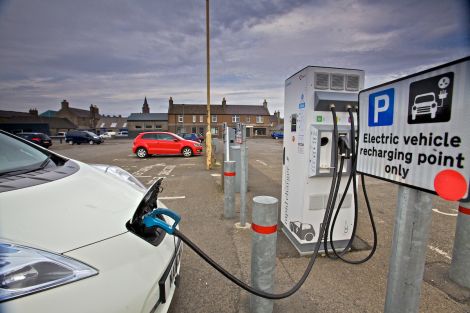Environment / Finances and availability put question marks over SIC’s electric vehicle targets
TARGETS for introducing more electric vehicles in Shetland Islands Council’s fleet may have to be pushed back due to the financial climate and the availability of cars and vans.
The current plan is to replace the existing small van and car fleet with electric models over five years, with a “substantial” initial investment needed in charge points.
But Shetland Islands Council’s environment and estate operations manager Carl Symons said there was a danger that the five-year target may have to be extended to ten years.
“It might not be achievable within the constraints of the current finances we find ourselves in,” he said.
In addition, there is also a backlog when buying new electric vehicles. “At this moment we are ordering vehicles that we don’t think we’ll see until well into the new financial year,” Symons added.
The intention is to press on as finance and availability permits.
However, no budget decisions have been made for the next financial year, with councillors due to set things in stone in February.
It comes as the SIC’s financial sustainability was highlighted in concern from auditors last year.
Symons said the council has modelled a variety of options including smart charging, basic charging and dynamic charging hubs located at “key points”, such as schools and care homes where SIC electric vehicles would frequently attend.
Dynamic charging would involve a bank of five or ten charge points where the available load is managed, Symons said, so it can charge multiple cars at once and the charge output is divided up across them.
“This means we don’t have to put in a new substation – you can use the existing available capacity on a building far more efficiently,” he said.
But to put it in place is very expensive, and the SIC is awaiting news of grant funding for a possible trial.
Become a member of Shetland News
“Largely we have a plan,” Symons said of the future roll-out. “We know what we need to do to meet the targets, but a combination of unavailability of vehicles and budget pressures means that those targets may need to be extended.”
Meanwhile a company recently made its way to Shetland to deliver electric vehicle training to technicians at the council.
Autotech Training undertook sessions on electric and hybrid vehicle training to assist the SIC in its transition.
Raymond Murchison, acting fleet team leader of fleet for Shetland Islands Council, said: “Currently, we have around 20 electric vehicles within our fleet.
“However, as with all local authorities across the UK, we are working towards electrifying our entire fleet and one of the key requirements was to ensure that our vehicles technicians held the relevant skill set to repair and maintain these vehicles safely.”
Become a member of Shetland News
Shetland News is asking its many readers to consider paying for membership to get additional features and services: -
- Remove non-local ads;
- Bookmark posts to read later;
- Exclusive curated weekly newsletter;
- Hide membership messages;
- Comments open for discussion.
If you appreciate what we do and feel strongly about impartial local journalism, then please become a member of Shetland News by either making a single payment, or setting up a monthly, quarterly or yearly subscription.














































































